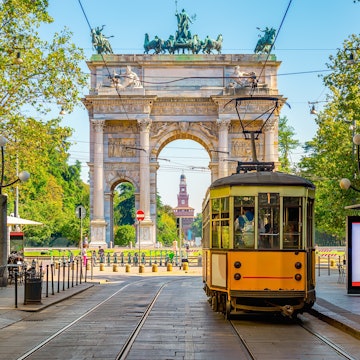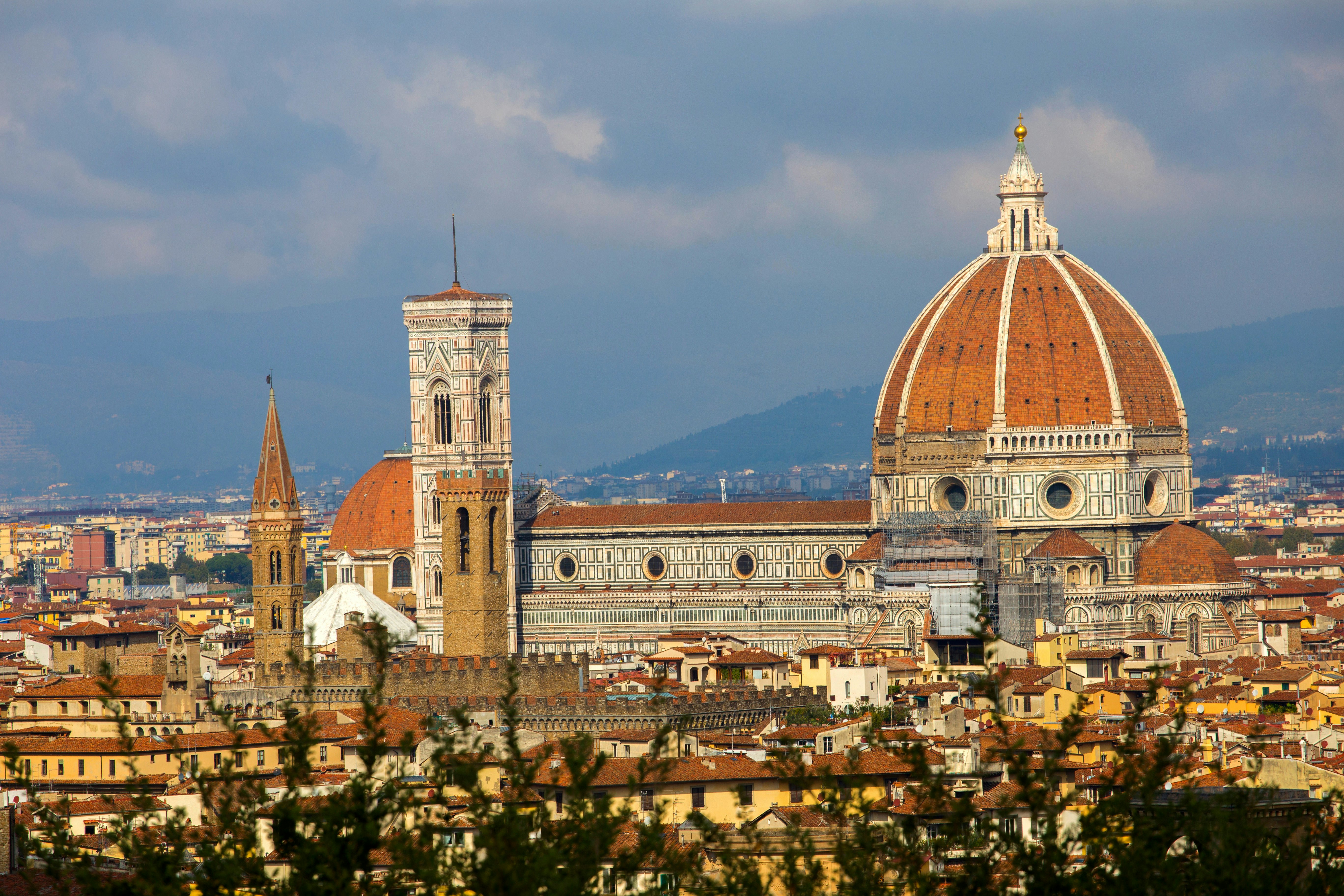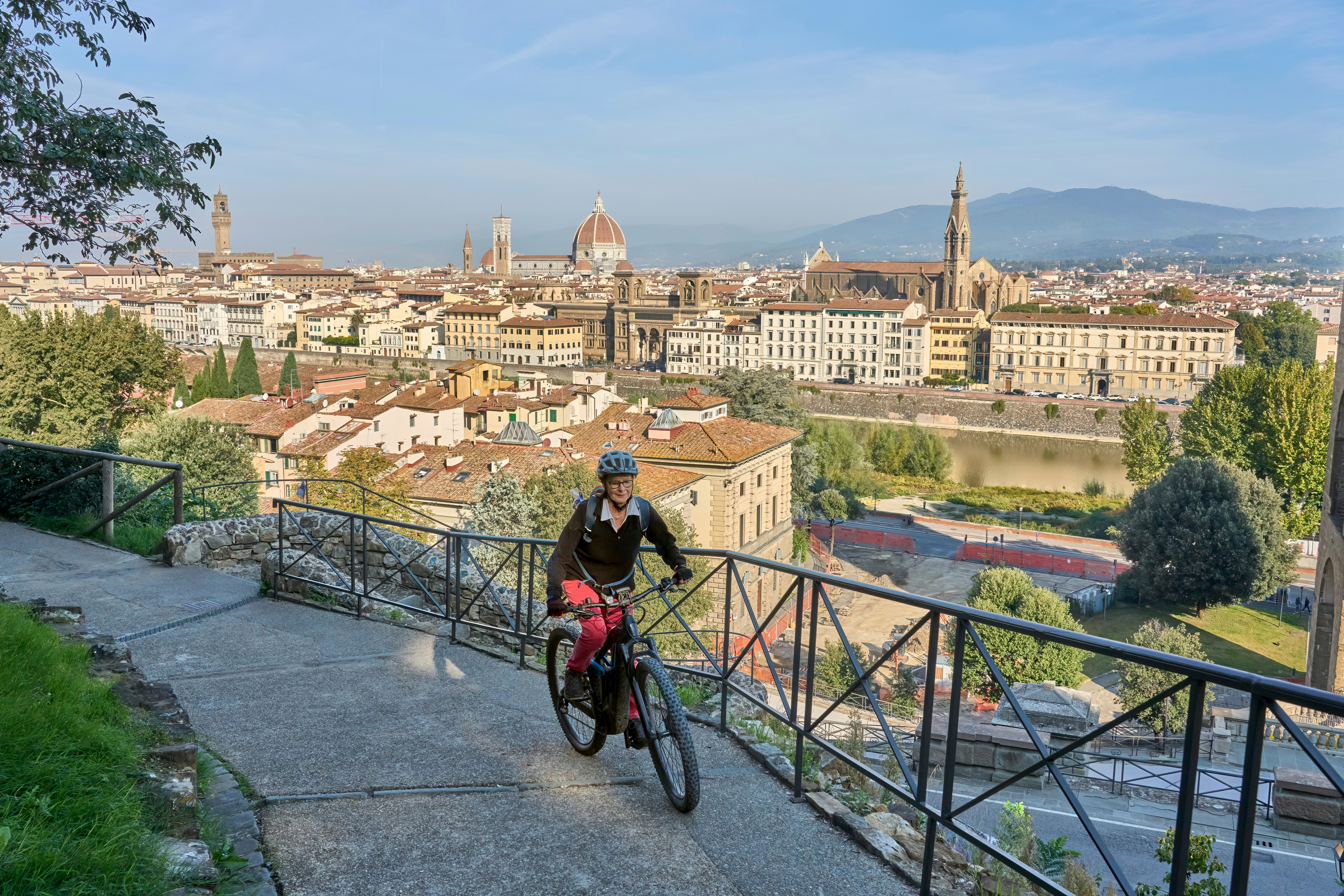
Dec 16, 202414 min read
Getting around Italy: from car rentals to trams and buying train tickets at the cheapest prices
The narrow streets of the Florence's historic center. John Silver/Shutterstock
With its compact size and abundance of architectural landmarks, navigating Florence is hardly a challenge.
Yes, getting lost in the narrow streets that branch out from the open squares does happen, but it’s usually only a matter of minutes before you find yourself in front of a world-renowned monument that reminds you where you are.
The UNESCO-listed centro storico, the heart of the Renaissance city, stretches for about 5 sq km (1.9 sq miles) on both sides of the Arno River. Although the list of cultural sights is seemingly endless, there is no better way to explore than walking. A good pair of sneakers might be the only essential item to pack.
In case you are planning to go further afield, an expanding network of tram lines allows you to get out of the inner city. And the conveniently located Santa Maria Novella railway station links you to many cities in Tuscany and the whole of Italy through regional and high-speed trains departing daily.

More often than not, walking is not just the best way of getting from A to B but also the only way to do so. Many of the inner streets are reserved for pedestrians during the day, and even when other options are available, crowds can make moving on wheels difficult.
It doesn’t really matter where in the city center you decide to book your accommodations – all major sights will be within walking distance from any of the central neighborhoods. Most of the inner city is flat, with the exception of the areas of Oltrarno that rise from San Niccolò. Climbing up the San Miniato hill to reach Piazzale Michelangelo and then the Basilica di San Miniato al Monte may break a sweat, but you’ll be rewarded by views that are hard to beat.
Florence has no subway system, but it does have a modern tram network that links the city center with the airport and the neighborhoods outside of the historic center. If you’re flying to or from Florence’s Amerigo Vespucci Airport there is no need to take an expensive taxi – with just €1.70 (about US$2) you can travel in and out of the city center in about 25 minutes.
Tip for buying tickets on the tram: Since early 2024, all trams in Florence have added contactless ticket machines on board. You no longer need to worry about purchasing a ticket in advance and validating it – just tap your credit or debit card and you’re good to go.
Although walking is often faster than using public transport in the inner city, Florence’s fleet of buses run by Autolinee Toscane allows you to get to the hilly surroundings effortlessly.
Take bus 12 from Piazza Ognissanti to get up to Piazzale Michelangelo, where a bronze copy of David will welcome you to the terrace overlooking the Duomo and the city’s red rooftops. If you are planning to spend a day in Fiesole to discover the archaeological area, take bus 7 from the Santa Maria Novella railway station.
All buses in Florence have a contactless system for purchasing tickets. Alternatively, you can buy paper tickets in most newspaper stands and tobacco stores (tabacchi) recognizable from the “T” sign. Tickets cost €1.70 and are valid for 90 minutes. Buying your ticket directly from the driver will cost you €2.70 (about US$3).

Santa Maria Novella (SMN) is Florence’s main railway station, conveniently located less than 1km (0.6 miles) from the Duomo. It’s not the only train station in the city – Firenze Rifredi and Firenze Campo di Marte are located northeast and northwest of the historic center, respectively – so be sure to get off at the right one when arriving.
Although you are unlikely to need trains when moving within Florence’s boundaries, Tuscany’s extensive rail network offers many opportunities for day trips. Regional trains reach all major Tuscan cities, while high-speed Trenitalia Le Frecce and Italo trains travel beyond Tuscany’s boundaries to Rome, Milan, Venice, Bologna, Naples and many other destinations.
Train tickets can be bought online at trenitalia.com, italotreno.it, or directly at the station. When buying tickets for regional trains online, remember to check in by clicking the link in your confirmation email before departure. If you buy a paper ticket it should be validated before getting on the train at one of the green machines scattered around the station. Not checking in or not validating your ticket will translate into a fine. You don’t need to check in or validate tickets for high-speed trains.
Regional trains allow for some spontaneity: booking in advance is not necessary, as prices are fixed and carriages hardly fill up. Tickets for high-speed trains are best purchased a few weeks before your trip to guarantee your seat.

To speed up your Florentine explorations just rent one of the many RideMovi bikes you see scattered around the city. Electric bicycles allow you to get from one side to the other in minutes (traffic allowing) and can be parked anywhere without having to worry about taking it back to your starting point.
To use the bike-sharing service, download the RideMovi app and locate the closest e-bike. Unlock the bike by scanning the QR code on the handlebar and start cycling. Renting a RideMovi e-bike costs €0.25 per minute.

Driving inside Florence’s city center and its immediate surroundings is a bit of a nightmare. The historic center has many limitations when it comes to motorized vehicles, and heavy traffic is a permanent feature of the roads encircling the city’s core. Renting a car only makes sense if you are planning to travel to the countryside, whether in the Chianti region or further south in Val d’Orcia.
Booking your car ahead is essential if you are visiting Florence in the high season as prices spike during the summer months. All major car rental companies operate in Florence, with offices either in the airport or in Borgo Ognissanti, near the Santa Maria Novella railway station. Costs vary greatly depending on the season, but prices typically start at around €50 (US$58) per day for a small car.
If you are driving your own vehicle it’s important to remember that most of the inner city is a ZTL, a Zona a Traffico Limitato (limited traffic area) where traffic is restricted during the day. Entering during the hours in which the ZTL is active means getting a hefty fine in the mail – look out for signs.

Parking can be complicated. Public parking slots in or near the city center are marked by either blue or white stripes. Blue parking slots are reserved for residents, while (rare) white parking slots are for everyone else. Between 8am and 8pm, white parking slots cost of €2 (US$2.34) or more per hour. They are free during the night. Private parking spaces such as Garage Europa or Parcheggio Stazione Santa Maria Novella, start at €2/hour or €30/day (US$35). Locals often park for free on the outskirts of the city and then take the tram to get to the center.
The two major taxi companies operating in Florence are Taxi 4242 and Taxi 4390. Give them a call or send a WhatsApp message to request a ride. On weekdays rides start at €3.80 (US$4.45), growing to €6.10 (US$7.14) on weekends and holidays and €7.70 (US$9) at night, with a minimum spend of €5.50 (US$6.44), €7.70 or €9.20 (US$10.77) per run. A trip to the airport from the city center costs around €30.
Travelers with mobility impairments may find it difficult to navigate the network of uneven stone alleys that intersect to form Florence’s city center. Narrow sidewalks and heavy traffic on roads open to cars contribute to the challenge.
All trams and the majority of buses are wheelchair-accessible and have a dedicated space for wheelchair users on board. Yet, getting on and off public transport during peak hours can be difficult.
Taxi 4242 and Taxi 4390 both have minivan cabs suitable for wheelchairs, but be sure to book in advance.